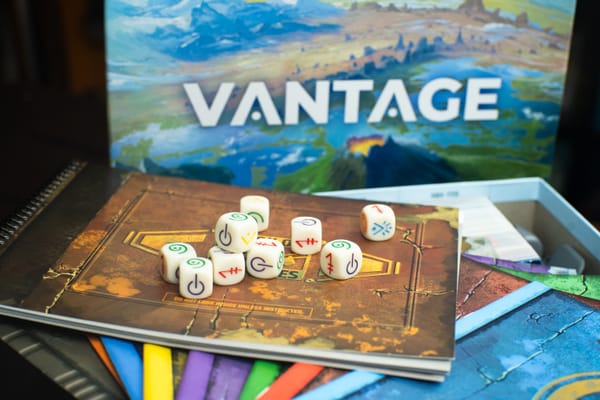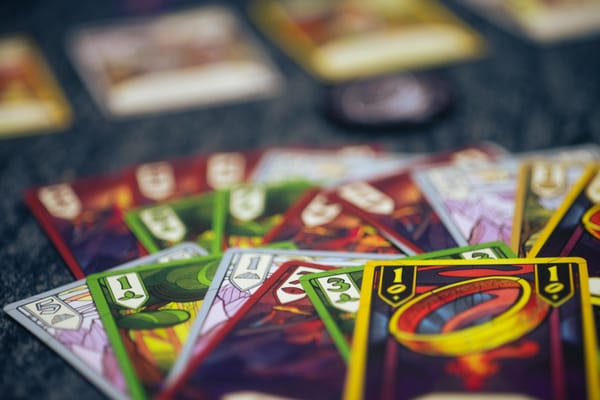The forest and the trees: My trick-taking journey
A rambling look at the board games niche I've found myself in

Getting deep into a hobby is an interesting thing. When I first started getting into board games heavily, I was excited to experience the breadth of what designers had to offer. I wanted to see the world, in a manner of speaking. Whether it was an out-of-print Euro I stumbled on (thankfully Knizia’s 1998 classic Through the Desert is now easy to find), a game that was far too heavy for my relative inexperience at the time, or the simplest, most inane card games — I still have nightmares about We Didn’t Playtest This At All (Cieslki, 2007) — I was there for it all.
And Kickstarter. Oh, the Kickstarters. If a game looked even moderately appealing, I was ready to back. I did in many cases, and plenty of those games have either left my collection or really ought to. That’s not to say anything right here, right now about the value of Kickstarter as a platform, but more that I, like many others, was excited. Not for a specific thing, but for the concepts. Board games are — and still are — an exciting thing.
Today, some 15 years later, I’m not so excited about every big box that comes out. I’m still trying to figure out when I’m going to play Vantage (Stegmaier, 2025) with a toddler running around the house. (I should just clear off my office table, really.) I’d like to play Earthborne Rangers (Fischer, Flugaur-Leavitt, Navaro and Sadler, 2023) with my wife, but finding the time for a four-hour game is, as you’d imagine, growingly difficult. That’s not a complaint — it’s just an accepted reality, and it’s pushed me into different sectors of the hobby. It’s not what got me into card games, but it’s sure convenient to have a great collection of games that we can play with friends in less than an hour.
All that to say, my gaming over the last five years has grown increasingly specialized. I’m less interested in every release. Given the incredible volume of quality releases these days, that’s probably a good thing — keeping up was difficult enough. I certainly don’t mean to say that I’m only playing trick-taking games these days, but I certainly gravitate there (as you can well see on this here newsletter). I also don’t mean to say that I possess any unique expertise. But I do think I’ve found some branches of the hobby where I’ve spent more time, rather than climbing the trunk, if we’re to use a tree metaphor. (I can count on one hand the number of trees I’ve climbed in my life, though.) What got me there? I’d like to explore that a little bit more through the lens of one part of gaming where I’ve invested a lot of my attention.


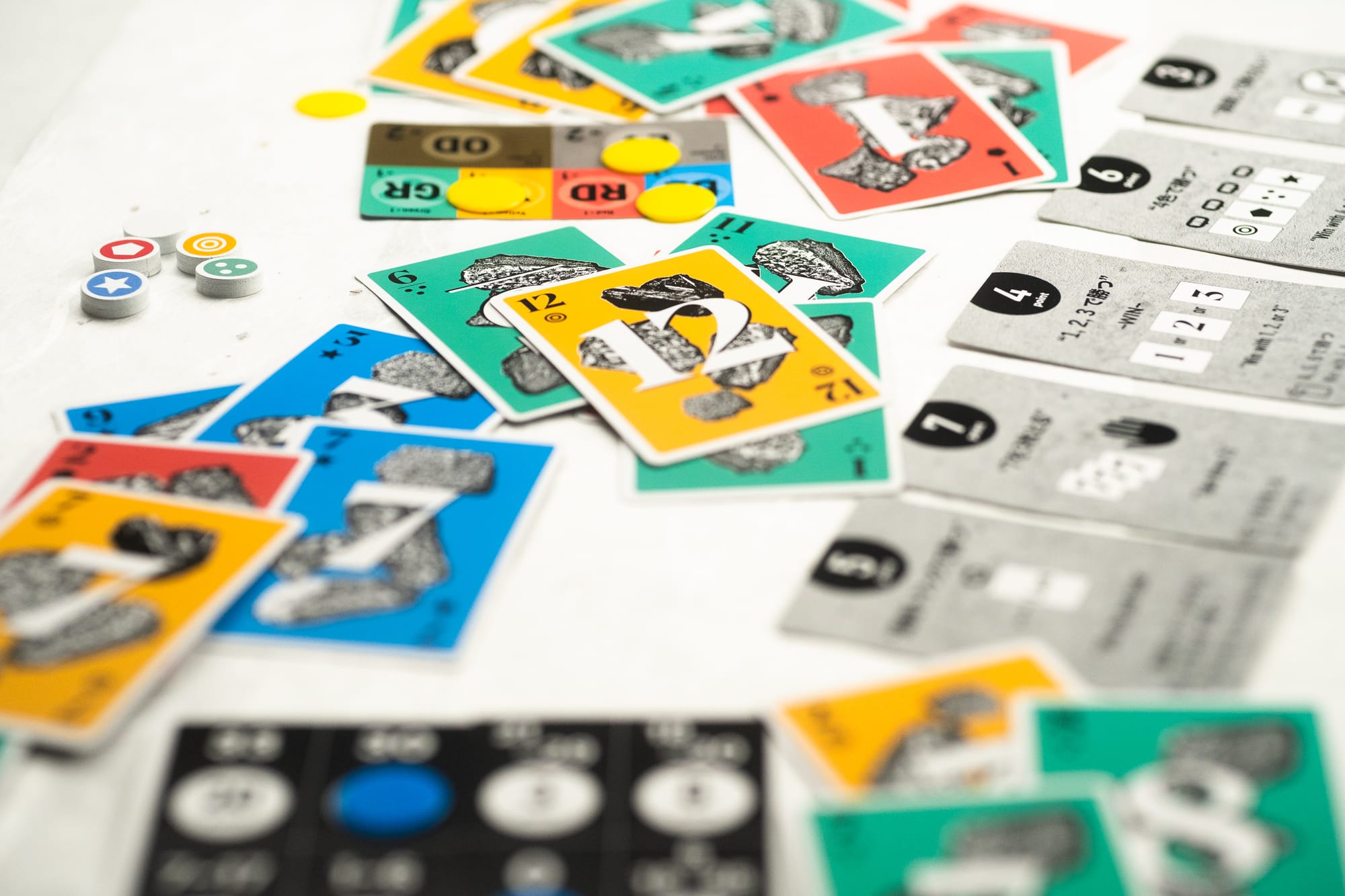
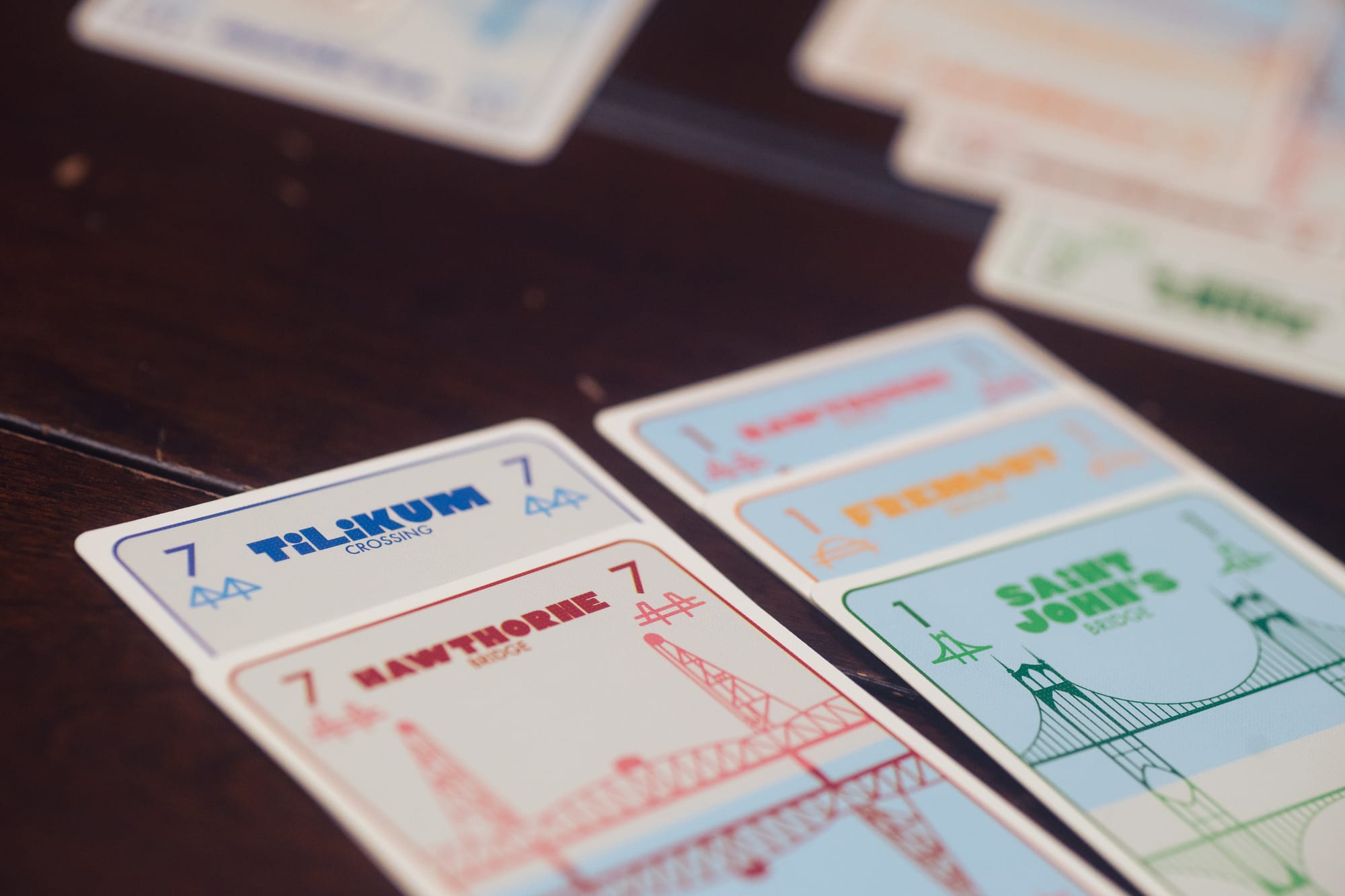
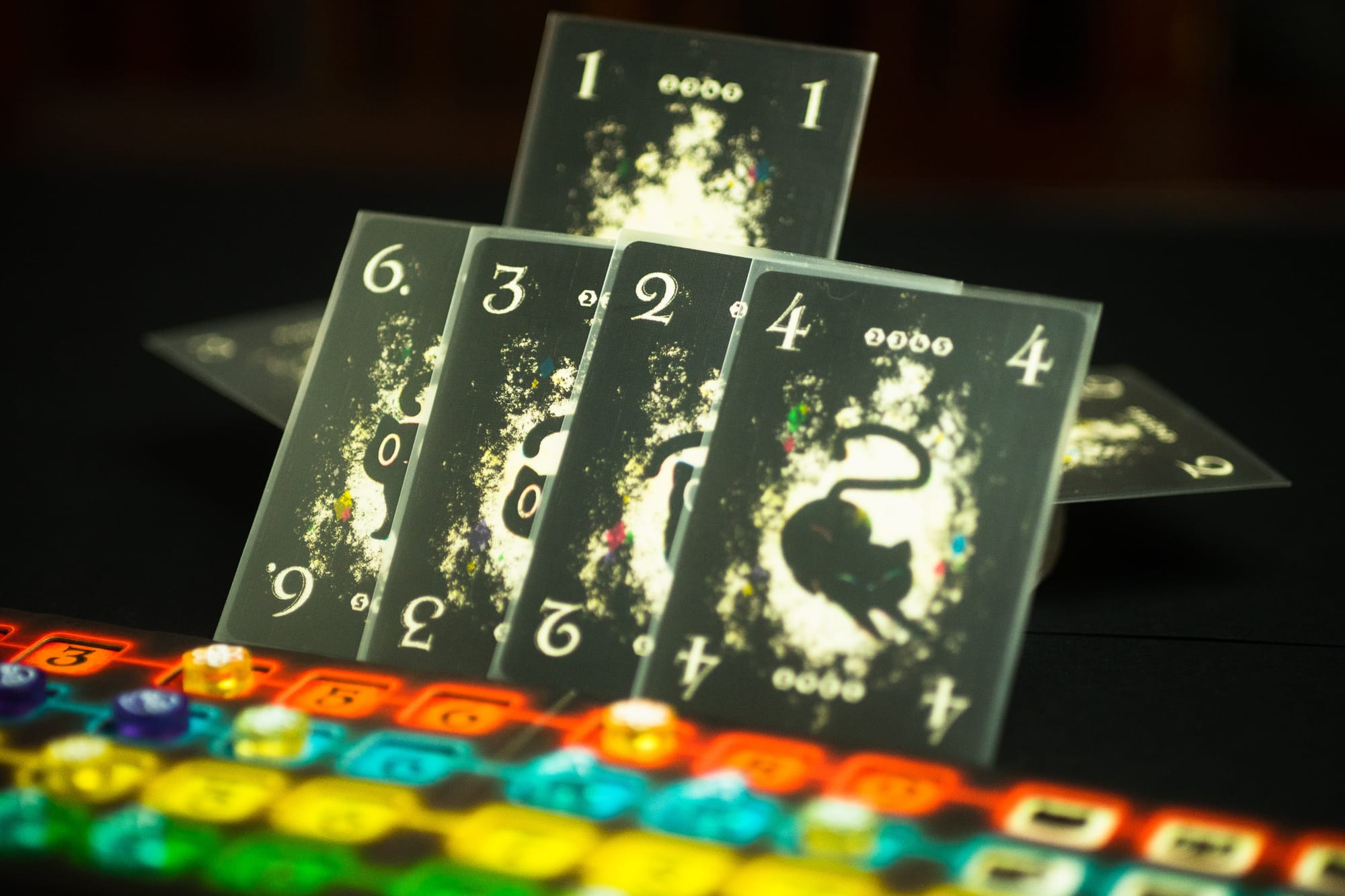

Kansas City, Crisps, Quattro Tricks, Bridge City Poker, Cat in the Box, and Fives | Photos by Matt Montgomery
Trick-taking, signal-to-noise, and tips for cutting through the noise
Like many folks around the world, I was acquainted with trick-taking from a relatively young age. My parents played partnership Pinochle (1864) with family, and I played an incredible amount of Hearts (1850) in Windows (I’m sure I played back in 3.1, but I’m a bit more certain that I played in 95 and 98, too. Enough about aging, though.) I was broadly aware of modern trick-taking games, and I played some of them. Few captured me like The Crew: The Quest for Planet Nine (Sing, 2019), and a helpful tip got me even more hooked through communities like the Portland Game Collective and the Trick-Taking Guild on Board Game Geek.
Tangentially: My friend Chris Wray wrote about trick-taking and some of the tendencies he’s seen around the Golden Trickster award, which he originated in the Trick-Taking Guild. I appreciated his thoughtful discussion around what the award has become, in his eyes. It provided me cause to reflect on my recommendations here and the small role I play in your lives. It’s worth a read, even if you’re not deep into trick-taking. The following excerpt, which follows a mention of his games being nominated for the Golden Trickster, really resonated with me when I read it over the weekend:
Yet, despite that personal joy, I still find myself annoyed by the whole exercise. While I watched the growth of trick-taking with tremendous joy and more than a little pride, it is also clear that the mechanic’s moment in the sun has ended. There are a lot of reasons for that. But from my vantage point, the biggest reason is that the noise started to drown the signal.
That’s the premise of the piece, and you’ll have to read it for his full argument, which is convincing. I agree with much of what he’s said, and it leaves me hoping that I can provide at least some signal here by turning focus on interesting, innovative games — not just the big releases (some of which are great!), and not just the obscure ones you’ll never be able to play (again, some of which are also great!).
At any rate, back to trick-taking: As I look over at my unwieldy collection of trick-takers, I see a lot of great games. Scout (Kajino, 2019), Maskmen (Sasaki and Shinzawa, 2014) are two great titles released by Oink Games, a Japanese company who produce some truly wonderful games. With Monster Trick (zur Linde, 2015) and Jalape-NO! (Kiesling and Kramer, 1998), we have four great examples of the pre-2020 foundation being laid by publishers outside the United States. The list could go on (and maybe I’ll post about that next week!)
When I jumped headlong into trick-taking, it was easy to see two types of games: traditional card games, which have existed much longer than I have, and new card games, which are just coming out now. But there’s room in the middle, and the games are as innovative as any game released today. It might not seem that way looking backward, but remember: Games are always building on what came before. It’s part of what makes the hobby so exciting and interesting. There’s a history built into these card games, just like there’s a history built into worker placement games, like there’s a history built into cooperative games. That history isn’t just a thing we can look at or read about — it’s a thing we can engage in. There are so few opportunities we have to experience history first-hand, and while we can’t replicate the social conditions around card games, we can play games under the same sets of rules with the same types of components. How amazing is that?
In trick-taking, that history allows us to gain a perspective on history, and it’s not just isolated to a European and American view. Dou Dzhu is a shedding game played with a French deck, and it’s an artifact of the 1950s Chinese cultural revolution. Zheng Fen is a Chinese shedding game of an unknown origin, and it’s notable for our purposes as the game that inspired Tichu (Hostettler, 1991).
A game like Hearts might seem straightforward — just a game that sort of came around and stuck — but it’s anything but. There’s a history there dating back to at least the early, early 17th century with the French game Reversis. (Next time you play Rebel Princess (Byrne, Guerrero, Peláez and Virgós, 2023), consider that you’re playing a game with well-defined roots dating back over 600 years. Whist has roots in the 15th century English card game Ruff and Honours.
The tarot deck dates back to the 15th century, with British philosopher Michael Dummett laying out a history of the deck with an 1425 invention. That’s 800 years from today, which is really quite remarkable. The tremendous Le Plateau (Brown and Gallardo, 2021) uses a French tarot deck, so when I played it this year at TTUTCON II, I was, in essence, celebrating the 800-year anniversary of the game.
You can even look at more modern games like the Puritan-rooted Rook (Parker and Parker, 1906), which tells a whole story about religious culture in the early 20th century just by its very invention, and there are regional variations on scoring that tell us about migrations, movements and social developments in the United States. Simple changes like which cards score points are echoes of history laid on a table.
That’s certainly not the tangent I set out to follow here, but it all sort of ties back to what Chris wrote. We hear the term ‘trick-taking renaissance’ heralded a lot these days. It’s a funny old term, because it’s ultimately about a mechanism in games that predates the European Renaissance. (That’s not an argument against the term, but it’s a bit of a funny thing to consider.) What the term misses is the wealth of games that came before, whether we’re taking about historic games or games simply released before 2021, the year commonly agreed to be the start of said renaissance.
None of this is meant as a diatribe against the term’s existence, which does describe a real tendency in the market. Perhaps ‘renaissance’ isn’t accurate, but it’s not so exciting to call things a ‘bubble’ in the middle of it. Increasingly over the past four days, I’ve come to agree with Chris’s assertion that “the mechanic’s moment in the sun has ended” and at least the underlying cause he states outright. Perhaps that shift isn’t a bad thing on its own, assuming we don’t see a significant retreat from players of trick-taking games. I do wonder if it helps restore trick-taking to a more rightful place in gaming, as even if a bubble has burst or a spotlight has shifted, this is an enduring idea that’s many centuries old.
I wonder what shifts we’ll continue seeing over the next decade in trick-taking. If the last five years saw a boom in imported trick-taking games, how will aggressive political tariffs impact those games being published more accessibly? Will publishing outfits like Portland Game Collective, New Mill Industries, Allplay, Bezier, GameHead and CMYK continue to find opportunities to help get these games to a broader public? I tend to think so, in one form or another. The efforts those publishers have put into making these games available won’t vanish. Will the appetite remain for short-run trick-taking games, especially among followers of small, independent publishers? That’s the reality here. Even today, small-run publishers aren’t printing even thousands of copies of games. If demand dips significantly, will there be enough of a reason to continue pushing in a particular direction? There are more questions than answers.
I don’t doubt that independent designers will still be publishing small-volume games, whether that’s for release at the biannual Tokyo Game Market or the increasing numbers of indie game fairs popping up around the U.S.; the question that remains is if the demand will exist for folks to get their games to a slightly wider market. Will that market continue to grow?
I hope that we can cut through the noise effectively together. Written media about board games is not in high demand, which I’m sure many of you readers have felt. I remember when I started getting into board games, searching for people writing about games. I loved the filmed efforts of folks like Shut Up and Sit Down, which helped drive my interest in the hobby with their particular brand of low-production humor. (I still enjoy Shut Up and Sit Down, but it must be said that they’re notably different in the way things are approached when comparing their early videos, and that’s not a recent change.) But what I wanted was written content, and I found some — but today, will you find much more than you could a decade ago? There’s some new blood, sure, but even written reviews on BoardGameGeek are drowned out by video content. And that’s not to say that video content is bad or harmful as a general rule, but I can read even a long article in less than 10 minutes — a quality video review, though, is going to take quite a bit more time. I don’t know quite where I’m going with this, but they’re thoughts all coalescing. If I were a public intellectual, I’d probably say something about the attention economy, but I’m certainly not going to do that.
Four tips for cutting through the noise
I’d like to end this week’s newsletter on a note that’s a bit less scattered, a bit less stream-of-consciousness. To that end, here are five tips for cutting through the noise.
- Find writers you enjoy reading, whether or not their perspectives align strictly with yours. A few short recommendations from my side are Dan Thurot at Space-Biff!, the crew (including Chris Wray) at The Opinionated Gamers, and the excellent games magazine Senet. Watch videos from folks you enjoy, too — find folks who will help you understand what it is you like, what you don’t, and where your favorite mechanisms are headed.
- Don’t focus solely on games that have just come out — explore what’s come before and discover what others have really valued in the past. You don’t have to go back centuries, but at least go back a few years. In a niche, you’ll find some really passionate folks who want to tell you about those games.
- Don’t dismiss a game because it doesn’t fit a narrow casting of your expectations. Whether it’s that too-human desire to avoid popular things in favor of what you’ve ‘discovered’, or if it’s dismissing a game because it wasn’t popular enough, we should all try to consider things on their own merits, not on perceived merits.
- Think about what you can do to help others cut through the noise. Maybe it’s about recommending a tried-and-true game to your friends, bringing some great games to game night instead of the latest hotness, or writing about games you think deserve more attention. (You don’t have to start another YouTube channel, though. Please don’t do that unless you really want to.)
That last one’s important to me, personally. I want to be somebody who helps cut through the noise. As a whole, the board game hobby is getting noisier, and it’s not likely to slow down. Perhaps it’s an inevitable element of a growing hobby, but this is the space I’m in. I’m hopeful that I can help you cut through the noise, and know that I’ll always endeavor to get better at it. (Unfortunately, I don’t think that includes “writing short” or “self-editing” in my case. This is still entirely a passion project.)
Well, thanks for joining me on that long and winding road. (Cue the music.) I hope you’ll join me next week, when I’m planning to talk about great trick-taking games that preceded the aforementioned trick-taking renaissance. Maybe November’s just going to be my trick-taking month, I dunno.
In personal news, I’ll be taking some time off later in the year, as my wife and I are expecting our second child some time around Thanksgiving. It’s all very exciting. I’ll still be writing my annual gift guide, which I’ll hopefully start this week if procrastination doesn’t get the better of me, but it’ll be scheduled in advance and all that.
https://www.donteatthemeeples.com/tag/trick-taking/
https://www.donteatthemeeples.com/four-games-to-replace-the-classic/
https://www.donteatthemeeples.com/four-tips-self-publishing-games-chris-wray/


